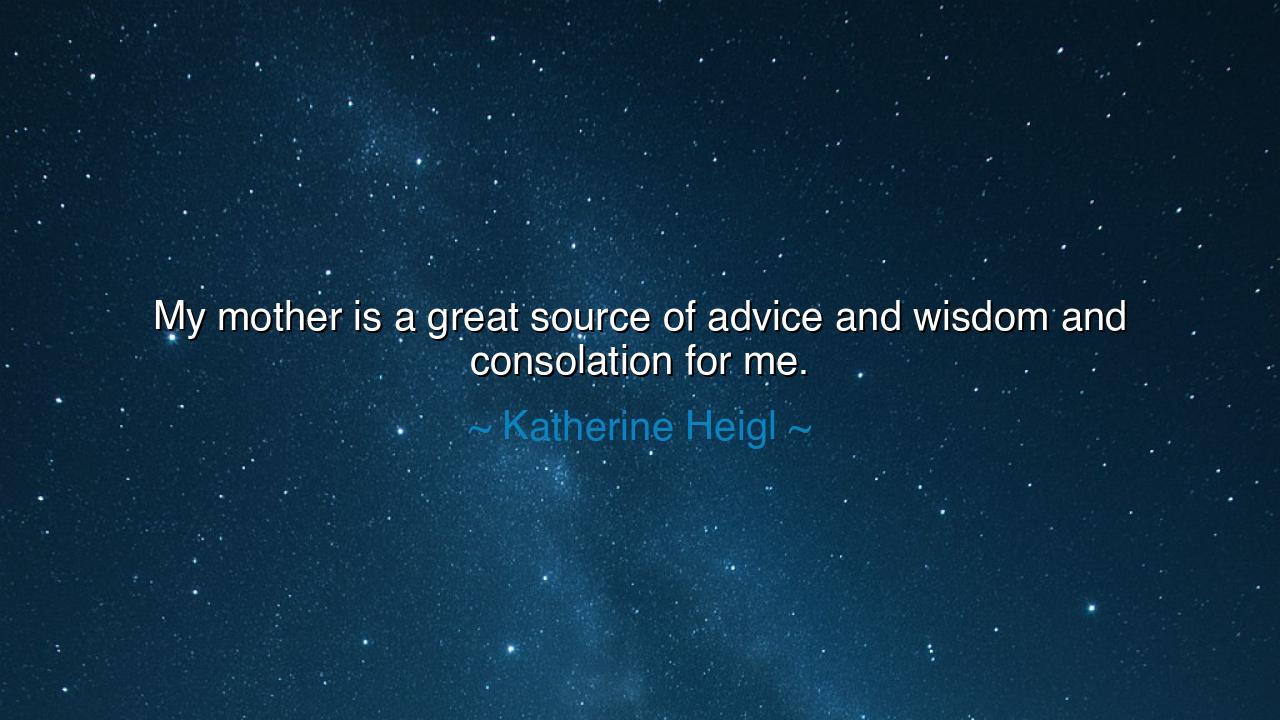
My mother is a great source of advice and wisdom and consolation






Katherine Heigl, with the tenderness of a daughter’s heart, proclaims: “My mother is a great source of advice and wisdom and consolation for me.” In these words lies a truth as old as the hearth: that the mother, giver of life, remains also a giver of counsel, of strength, and of comfort long after the child has grown. To her, the child returns not only for sustenance of the body but also for the sustenance of the soul. For in the mother’s heart dwells a storehouse of wisdom, born of love and trial, that no book nor teacher can replace.
The ancients revered this sacred role. Among the Greeks, the goddess Demeter was honored not only as a bearer of harvests but also as a source of consolation, guiding mankind through grief and renewal. In the Scriptures, the command to “honor thy father and thy mother” was not mere duty, but recognition that parents hold a reservoir of knowledge, their advice a light for the uncertain paths of life. The maternal voice has ever been regarded as a guide when all other lights dim.
History offers luminous examples. Augustine of Hippo, one of the greatest thinkers of the Church, often confessed that his path to faith was shaped by the prayers, counsel, and tears of his mother, Monica. Her consolation and unshaken guidance pulled him from the chaos of youthful error to the wisdom of spiritual truth. Without her, his legacy might have been lost to the shadows. Thus Heigl’s words echo an ancient pattern: that mothers are often unseen architects of greatness.
The daughter’s acknowledgment is itself a lesson in humility. To confess dependence on another, especially upon one’s mother, is not weakness but strength. It is to recognize that wisdom is not forged in isolation, but received in relationship, often through those who have walked the path before us. In moments of despair, when the heart falters, it is the consolation of the mother that steadies the soul and renews its courage.
Let the generations remember: no crown is brighter, no throne more steadfast, than the love and guidance of a mother. The world may offer many teachers, but the advice, wisdom, and consolation of the maternal heart carry an authority deeper than law, older than kings. He who listens to such counsel walks with strength; she who honors such guidance carries a treasure greater than gold. For in the mother’s love lies one of the truest reflections of divine care upon the earth.






HLHoa Lam
Reading this evokes questions about the different forms of influence a parent can have. Does the speaker value advice more in times of crisis, or is it a steady influence throughout everyday life? I also wonder how much of this trust is earned through repeated experiences versus innate familial bonds. Could someone outside the family ever provide the same level of consolation and wisdom, or is there something uniquely irreplaceable about a mother’s guidance?
DDangNam
I am struck by the combination of wisdom and consolation in the description. It makes me ask whether these two qualities are naturally linked in parental relationships. Is emotional support more effective when paired with practical guidance? Additionally, I wonder how much of this bond is cultivated intentionally versus naturally occurring through shared experiences. This quote inspires me to explore the ways we nurture trust and mentorship within families, and how those lessons shape our adult lives.
NHNguyen Quang Huy
This quote highlights the emotional support aspect of parental relationships. I’m curious whether the advice mentioned is more practical, philosophical, or moral in nature. How does one discern which guidance to follow when advice is given? I also question whether such reliance on a parent might affect independence in adulthood, or whether it strengthens one’s ability to navigate complex challenges. The statement makes me reflect on my own sources of consolation and whether they are equally reliable.
THLe Trong Hieu
I feel warmth and admiration in this statement, but it also prompts me to consider the universality of such relationships. Do most people have a mother or parental figure who serves as a consistent source of comfort, or is this a rare privilege? It makes me question how family dynamics, cultural background, and personal history shape the ways we seek and accept guidance. I also wonder whether the speaker’s gratitude is expressed as a daily practice or occasional reflection.
TPMinh Tam Pham
Reading this, I find myself reflecting on the unique role a parent can play in shaping one’s life. I wonder how much of our decision-making is influenced by parental guidance versus personal experience. Can relying on a parent for wisdom ever become a limitation, or does it always enrich our perspective? This quote makes me curious about the balance between seeking advice and learning through one’s own mistakes, and how that dynamic evolves over time.